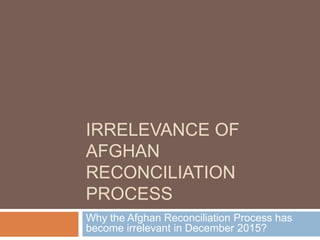Irrelevance of afghan reconciliation in dec 2015
- 1. IRRELEVANCE OF AFGHAN RECONCILIATION PROCESS Why the Afghan Reconciliation Process has become irrelevant in December 2015?
- 2. Reasons for irrelevance ’é© Afghan reconciliation process has always been tendentious. ’é© Supposedly Afghan led and Afghan owned, there are too many stake holders and spoilers ranging from regional to international ŌĆō state and not state actors who have continued to undermine the Afghan government as well as the people. Thus there has been no forward movement in the past six years since the same was mooted in January 2010 London Conference. ’é© Importantly today the Taliban is a much fragmented force, disunited, with many top leaders including the so called successor to Mullah Omar ŌĆō Mullah Mansoor either killed or injured. Other key leaders as Mullah Dadullah Mansour also decapacitated. ’é© Internecine fighting with the Daesh (ISIS) is also noticed.
- 3. Reasons for irrelevance ’é© Splits and fragmentation provides the Afghan National Defence and Security Forces (ANDSF) an opportunity to target each group separately and neutralise the same. ’é© An effective military strategy to neutralise these factions is therefore the order of the day and not talks. ’é© Encouraging intra factional infighting is another option. ’é© Talks could be held at the subterranean level with groups amenable to the same directly by the Afghan High Peace Council (HPC) without involvement of external elements.



